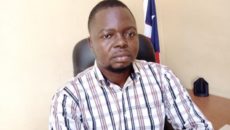GBARNGA, Bong – The 54th National Legislature has made five changes to the 2018/2019 budget law that could give citizens more say in the County and Social Development Funds and also improve transparency and accountability.
The changes to Section 9 of the Budget Law were the result of advocacy from the National Resource Management, a coalition comprising eight civil society groups working on CSDF reforms with support from USAID’s Liberia Accountability and Voice Initiative project, also known as LAVI. President George Weah signed the new law on July 14, 2018.
LAVI’s goal is to strengthen multi-stakeholder partnerships to advocate for and monitor policy and accountability reforms and increase the influence of citizens and media in the governance of public goods and services, as well as to create more effective, accountable, and inclusive governance in Liberia.
The five changes were among 17 proposed amendments the coalition submitted to the legislature for consideration.
Harold Aidoo, executive director of Institute for Research and Democratic Development, said although all 17 proposed amendments did not pass, the coalition appreciates the legislature’s effort in recognizing the need for change.
The ultimate goal, he said, is to have a standalone CSDF law that will curtail Legislative influence and empower citizens to make decisions about how CSDF is managed in their communities.

Harold Aidoo, executive director of the Institute for Research and Democratic Development. Photo: Moses Bailey.
“We have not achieved that ultimate goal, but we have made some gains,†he said. “It is our expectation that we can all work together with civil society and the media to advocate and to push for greater reforms to have a stand-alone CSDF law that addresses many of the problems that have engulfed the way the fund has been managed.â€
Under the new law, withdrawals from the CSDF account must be done in accordance with the Public Financial Management law and general accounting principles. Previously, withdrawals required two principal signatories or their representatives in accordance with guidelines set by the legislative and executive branches.
Under previous laws, the Minister of Finance Development and Planning was authorized to issue allotments based on the resolution of each county council against the amount appropriated in the budget for CSDF for each county.
Now, the money will be issued after a full accounting of previous amounts have been made consistent with the Public Procurement and Concessions Commission and the Public Financial Management law.
The MFDP minister “shall not make the payment to a county unless previous disbursements have been fully accounted for and financial reports duly made and certified by the County Legislative Caucus,†the law stipulates.
The change creates a system of check and balance that discourages unilateral actions by the minister and enhances the swift disbursement of funds under the financial management law, according to the coalition’s document on the changes.
The third amendment requires the election of a five-member Project Management Committee once every three years. The PMC must be comprised of a treasurer and a comptroller. The County Council must decide the criteria for qualifications based on professional training and work experience in accounting.
The project chair must have a minimum of three years’ experience in project management and must have resided in the county before taking the position or be willing to relocate to the county. This is intended to guard against having the committee members living outside of the county, making them unable to provide oversight.
The previous law required the election of a three-member PMC team once every three years. The new law would create more checks and balances on the three PMC leaders and promote competence in terms of electing a chair rather than appointing someone with political influence. Previously, PMC members were appointed based on political interest.
The new law also requires that only 10 percent of the CSDF allocation should be spent on the PMC’s operations. The idea is to spend more on projects that will benefit the community instead of on administrative costs.
Under the new law, the removal of PMC members requires the vote of two-thirds of the county council. The previous law allowed PMC members to be removed for causes determined by a county’s legislative caucus. Under the new law, the PMC members are more independent in the discharge of their duties.
Additionally, the processing of budgetary allocations and all documents to citizens and other relevant entities must comply with public procurement and public finance regulations under the new law.
“So we think that these are good news that will help to ensure that the County Social Development Fund ultimately benefits the population that it is intended for,†Aidoo said.
The Project Management Team which serves as the project monitoring and evaluation team of the target area must also report to the citizens of their respective areas and to the PMC on the progress of the project, a process that will result in timely payment for contractors.
Previously, there was no accountability and citizens did not have any information about CSDF implementation.
Lawrence Plator, the chairperson of Bong’s PMC, welcomed the changes.
He says the Project Management Team will help with monitoring and evaluation and give citizens confidence in the process. Historically, he said citizens did not trust PMC monitors.
“We had our own monitors, but again, what will come from us may not be satisfactory to the people,†he said. “The amendment of this budget law is welcoming, and we appreciate it, and we will use it as a working tool.â€
One of the changes that Plator is excited about is giving the county council the authority to remove members instead of having that power lie with lawmakers.
“It is the council that elects us, and so it should be the council to remove us,†he said.
The new law also changes the rules regarding county sitting where decisions of CSDF projects are determined. Previously, there was no requirement of publicity about the county sitting. Project decisions would be made by a county’s legislative caucus, the superintendent, and other district, traditional, and municipal delegates handpicked by lawmakers.
Under the new law, the superintendent must ensure that “extensive publicity,†through all media platforms—radio and TV; print and social media—is given to the meeting to encourage maximum participation. The attendance at county sitting must include an equal number of officials and opinion leaders from each of the traditional communities, statutory districts, and administrative districts.
Aaron Juaquellie, the national program officer for the Foundation for International Dignity, was another civil society head who welcomed the changes. However, he said for it to be implemented, there should be massive awareness.

Aaron Juaquellie, the national program officer for the Foundation for International Dignity. Photo: Moses Bailey.
The changes to the law would only be effective if citizens are actively informed so that they can know how to make decisions about the CSDF.
“Those are good things, but I am afraid that we will still bow down to where we were before,’’ Juaquellie said. “The society that we are discussing with is not literate. We spent years in discussing the Budget Law, for example in Bong County. While we were creating awareness and arguing that the law was violated, citizens themselves didn’t see it important.â€
The legislature and county officials will continue to have a grip on the CSDF because they are dealing with a highly illiterate population, he said.
Annually, the government pays US$200,000 to each of the 15 counties for development. In addition, some counties receive additional funds based on the concessions operating in their areas.
Bong, Nimba, Grand Bassa, Margibi, and Sinoe are among the counties that receive additional funds from the operations of concession companies.
Bong, for example, receives close to US$2.5 million annually from ArcelorMittal, China Union, BHP Billiton, and MNG-Gold.
Featured photo by Zeze Ballah




